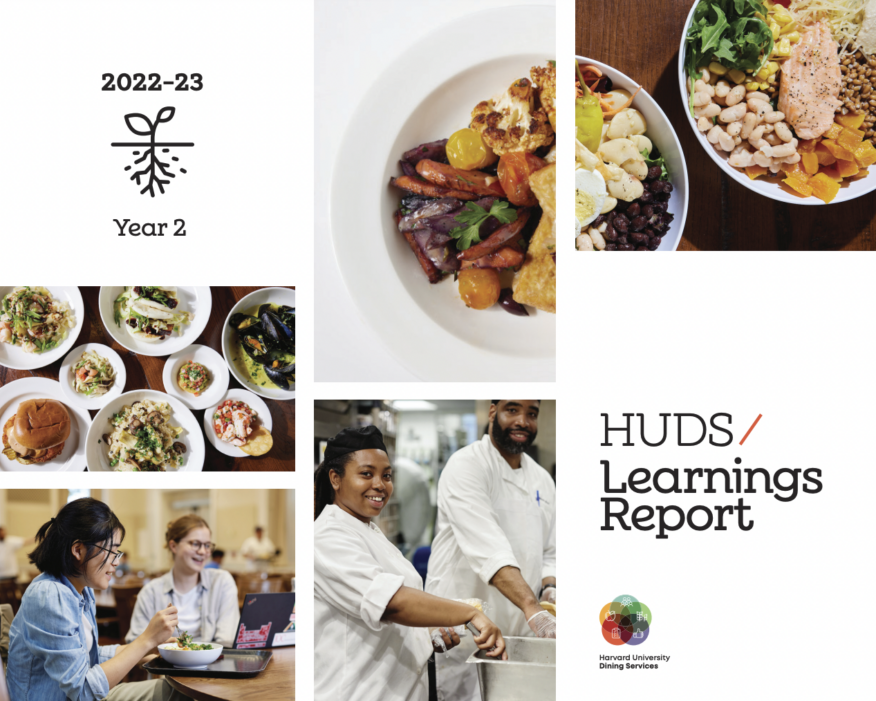Healthful and Sustainable Food
Harvard is rethinking food systems
Harvard’s Sustainable and Healthful Food Standards hold vendors accountable for making continuous progress across areas such as:
- Climate and ecosystems
- Consumer wellbeing
- Education and food literacy
- Food waste reduction
- Animal welfare
- Wellbeing of workers and communities along the value chain

Harvard was Inaugural Signatory to Coolfood Pledge in 2019
Reducing food-related emissions
As a signatory to the Coolfood Pledge, Harvard aims to:
- Reduce greenhouse gas emissions from food by 25% by 2030
- Simultaneously enable and support sustainable food systems
- Reduce wasted food
The City of New York acknowledged this work inspired them to also sign onto the Coolfood Pledge.
Sustainable and Healthful Food Standards
First published in 2019, Harvard’s holistic Sustainable and Healthful Food Standards are designed to ensure the University is advancing sustainability and food-system education while providing food choices that are healthier for people and the planet.
These standards hold Harvard’s food-service vendors accountable for making continuous progress across areas such as climate and ecosystems, consumer wellbeing, education, and food literacy, food waste reduction, animal welfare, and the wellbeing of workers and communities along the value chain.

- 83% farmland: Animal agriculture provides only 18% of calories and 37% of protein globally, but uses 83% of farmland and contributes 58% of food-related greenhouse gas emissions.
- 25% GHG reduction by 2030: Harvard joined the Cool Food Pledge in 2019 with a goal to reduce GHG emissions from food by 25% by 2030.
- Plant-Based Meals by Default: When hosting events and meetings, the Harvard Office for Sustainability serves plant-based meals by default, giving diners the choice to opt-in for meals with animal products. The Greener by Default strategy is inclusive, reduces our carbon footprint, and increases the healthfulness of meals.
Harvard University Dining Services
HUDS Learning Report
Each year, Harvard University Dining Services (HUDS) produces a Learnings Report of the prior academic year. In 2023, HUDS advanced plant consumption and focused on behavioral “nudges” to promote plant-based options. Students ate 20,000 fewer beef burgers in FY23 than in FY22 and shifted dietary patterns toward more plants, seafood, and poultry.

Sustainable Meetings and Events
Using tips from Harvard’s Sustainable Meeting and Event Guide, we can cultivate a culture of health and sustainability in how we plan campus meetings and events. Together, we can provide opportunities for staff, students, faculty, and visitors to eat well and stay active while advancing Harvard’s sustainability goals.

Leveraging food buying power
HBS Joins Farm Forward’s Leadership Circle
Harvard Business School (HBS) has joined Farm Forward’s Leadership Circle. Farm Forward is a non-profit that promotes conscientious food choices that support humane treatment of animals and advance sustainable agriculture. Increasing the humane treatment of animals also has a positive impact on human health since over 80% of antibiotics sold in the United States are used to treat farm animals living in cramped conditions. This contributes to antibiotic resistance in humans according to the Center for Disease Control.

Sustainable & Healthful Food Resources and Partners:
- The Harvard Chan School of Public Health’s Nutrition Source website
- Healthy Eating Plate
- Harvard Law School’s Food Law and Policy Clinic
- Sustainability at Harvard Dining
How We Operate
Harvard is accelerating new systems that enable healthier, low-carbon living—creating systems that can be scaled and adopted more broadly.
